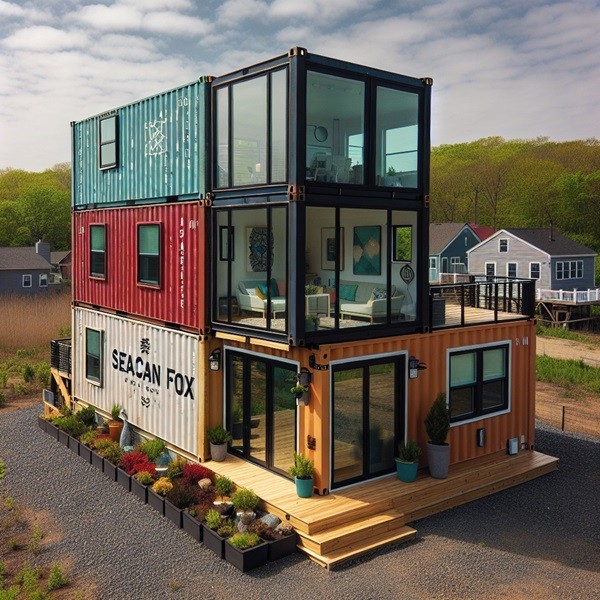
Key Takeaways
- Delaware requires permits and adherence to zoning laws for shipping container homes.
- Residential and industrial zones have different regulations for container homes.
- Permit processes involve several steps, including document submission and inspections.
- Shipping container homes must comply with building codes focused on safety and environmental impact.
- Engaging with local authorities and hiring the right contractors are crucial for a successful project.
Starting with Shipping Container Homes in Delaware: The Basics
So, you’re captivated by the innovative concept of shipping container homes and considering Delaware for your project? That’s a smart move, but before you let your creativity run wild, there are some important zoning and permit requirements you need to understand. These regulations are in place to ensure safety, compatibility with the neighborhood, and to protect the value of properties. Let’s dive into the essentials so you can move forward with confidence.
When you’re looking to build a shipping container home in Delaware, the first thing you’ll need to do is understand the basic legal framework. Each state has its own set of rules, and Delaware is no exception. You’ll need to comply with local zoning laws, which govern where you can build, and building codes, which dictate how you build.
My Favorite Container Homes Resource
I compared the top 3 Container Home Guides
to discover the ultimate resource!
See my top recommendation here
What Makes Delaware Unique for Shipping Container Homes
Delaware, known as The First State, has a diverse range of environments from bustling cities to serene countryside. This diversity allows for a variety of opportunities for shipping container homes. Whether you’re looking at a beachside retreat or an urban pad, understanding the specific zoning laws of your chosen location is key.
The Appeal of Shipping Container Homes in The First State
The appeal of shipping container homes lies in their sustainability, affordability, and versatility. In Delaware, the relatively moderate climate and the state’s openness to innovation can make it an ideal place for such a unique dwelling. However, it’s crucial to align your vision with the legalities of zoning laws to ensure a smooth building process.
Delaware Zoning Laws: Aligning Dreams with Legalities
Before getting too far into the design process, you’ll need to check the zoning laws for the area where you want to build your shipping container home. Zoning laws dictate what can be built and where, which means that just because you own a piece of land, it doesn’t mean you can build whatever you want on it.
Residential Zones vs. Industrial Zones: Knowing The Difference
Delaware’s zoning laws differentiate between residential and industrial zones, among others. Most importantly, you need to know if your land is zoned for residential use, as this will determine if you can build a home there at all. Industrial zones may allow for more flexibility in structure types, but typically aren’t suitable for residential dwellings.
- Check your property’s zoning classification with the local municipality.
- Understand the limitations and allowances of your zone.
Remember, just because a shipping container can be placed on a property doesn’t mean it can be used as a home. The intended use is a critical factor in zoning laws.
Variances and Exceptions: Tailoring Zoning for Your Home
If your dream location is zoned in a way that doesn’t allow for a shipping container home, don’t lose hope just yet. You may be able to apply for a variance, which is a special permission to deviate from the current zoning laws. These are granted on a case-by-case basis and require a good reason, such as unique land conditions that prevent traditional construction.
For example, if your property has an unusual shape that makes conventional construction challenging, you could make a strong case for a variance.
Navigating Permit Processes: A Step-By-Step Guide
Once you’ve confirmed that your property is zoned appropriately, the next step is to navigate the permit process. This can be intricate, so let’s break it down into manageable steps.
Gathering Necessary Documents for Your Project
You’ll need to compile a set of documents that typically includes your building plans, proof of property ownership, and sometimes, a site plan showing where on the property the home will be located. Make sure your plans comply with local building codes, which cover aspects like structural integrity, electrical systems, and plumbing.
Here’s a checklist of documents you may need:
- Building plans for the shipping container home.
- A site plan showing the home’s location on the property.
- Proof of property ownership.
- Any additional documents required by your local building department.
It’s crucial to have detailed plans that demonstrate your home will be safe and livable. This not only helps with getting your permit approved but ensures that your home will be a comfortable and secure place to live.
Scheduling Inspections: What to Expect
Once your documents are submitted and reviewed, the next step in the permit process is to schedule inspections. These inspections are crucial as they ensure that your shipping container home is being built in compliance with local codes and safety standards. Inspectors will check various aspects of the construction at different stages, so be prepared for multiple visits.
- Foundation inspection before the container is placed.
- Framing and
inspection after the container is modified but before interior walls are finished. - Final inspection upon completion of all work.
It’s essential to schedule these inspections ahead of time and to be ready for them. Delays in inspection can lead to delays in the overall project, so communication with your local building department is key.
The Role of HOAs in Permit Approval
If your property is part of a Homeowners’ Association (HOA), you’ll need to get their approval as well. HOAs often have their own set of rules and aesthetics that your project will need to adhere to. Present your plans to the HOA board and be prepared to make adjustments based on their feedback.
Remember, getting HOA approval is an additional step and doesn’t replace the need for municipal permits. You need both to legally proceed with your shipping container home.
Building Code Compliance: Ensuring Your Home is Up to Par
Building code compliance is a non-negotiable aspect of constructing a shipping container home. These codes are in place to ensure that your home is safe and habitable. In Delaware, these codes will address structural integrity, emergency egress, electrical systems, plumbing, and more.
Safety First: Structure and Design Standards
When it comes to safety, the structural integrity of your shipping container home is paramount. This includes ensuring that any modifications to the container, such as cutting out sections for windows or doors, do not compromise its strength. Furthermore, you’ll need to adhere to design standards that include proper exits in case of emergencies.
Delaware’s building codes will have specific requirements for these, so familiarize yourself with these standards early in the design process. It’s much easier to incorporate these requirements from the start than to try to retrofit them later.
The Environmental Impact: Meeting Green Building Codes
Delaware is no stranger to environmental concerns, and green building codes are part of the state’s commitment to sustainability. These codes might affect insulation requirements, energy efficiency standards, and even the materials you use. Complying with these codes not only helps the planet but can also lead to long-term savings on utility bills.
For example, you might need to use a certain type of insulation that has a higher R-value, which is a measure of thermal resistance, to meet the energy efficiency requirements.
| Regulations and Requirements | Description | Reference |
|---|---|---|
| Zoning of Property | Local government building standards for property use and structures, including mobile and container homes. | 1,2,3 |
| Permits and Building Codes | Necessary for construction, compliance with building codes, and obtaining permits for shipping container homes. | 3 |
| Codes Pertaining to Certain Types of Houses | Incorporation of shipping container homes into the 2021 International Building Code, with specific building code differences. | 3 |
| HOA Rules and Deed Restrictions | Potential need for specialized building permits based on House Owner Associations rules and Deed Restrictions. | 3 |
References:

Strategies for a Successful Shipping Container Home Project
Engaging with Local Authorities: Communication is Key
One of the most important strategies is to engage with local authorities early and often. This includes your local zoning board, building department, and any other regulatory bodies. Clear communication can help avoid misunderstandings and delays.
- Introduce your project early and ask for any guidance they can offer.
- Keep them updated on your progress and any changes to your plans.
- Be responsive to their inquiries and requests for additional information.
By establishing a good relationship with these authorities, you’ll find the process to be much smoother.
Additionally, you’ll want to consider how your shipping container home fits into the larger community. This means thinking about aesthetics as well as functionality. A home that complements its surroundings is more likely to be welcomed by neighbors and local officials alike.
Building a Strong Support Network: Finding the Right Contractors
Finding the right contractors who are experienced with shipping container modifications can make a huge difference in your project. They’ll be familiar with the unique challenges that come with converting containers into livable spaces and can provide valuable insights into the design and construction process.
When selecting contractors, look for those who:
- Have experience with shipping container projects.
- Are licensed and insured.
- Can provide references from past clients.
Remember, the cheapest quote isn’t always the best. Quality workmanship is essential for a home that is safe, durable, and comfortable.
Embracing the Unique Challenges of Shipping Container Homes
Shipping container homes come with a unique set of challenges, but with the right approach, they can be transformed into stunning and functional homes. Designing for small spaces requires creativity to maximize utility, and adapting to Delaware’s climate means prioritizing insulation and ventilation.
But when you’ve done your homework and navigated the zoning and permit maze successfully, you’ll find that shipping container homes offer a unique, sustainable, and often cost-effective alternative to traditional housing. With careful planning and a bit of tenacity, you can turn your shipping container home dream into a reality in The First State.
Designing for Small Spaces: Maximizing Utility
Creating a home from a shipping container means working within a compact space. This constraint can actually be a catalyst for innovation. To maximize the utility of your shipping container home, consider multifunctional furniture, built-in storage, and a minimalist approach to design. This not only ensures that you use every inch of space wisely but also contributes to a clean, uncluttered living environment.
Another tip is to use light colors and large windows to create a sense of openness. Strategic placement of mirrors can also help to visually expand the space. The key is to plan each element of your home with both function and aesthetics in mind.
Remember, in a small space, everything is visible. Choose your fixtures and finishes carefully, as they will define the look and feel of your entire home.
Adapting to Delaware’s Climate: Insulation and Ventilation Best Practices
Delaware’s climate, with hot summers and cold winters, demands careful consideration of insulation and ventilation in your shipping container home. Proper insulation is crucial to keep your home warm in the winter and cool in the summer. Spray foam insulation is often recommended for shipping containers because it provides a high R-value and acts as a vapor barrier.
As for ventilation, it’s essential to prevent condensation and ensure good air quality. Consider energy-efficient windows, properly placed vents, and possibly a small HVAC system to maintain a comfortable environment year-round.

Frequently Asked Questions (FAQ )
What is the maximum size for a shipping container home in Delaware?
The maximum size for a shipping container home in Delaware will depend on local zoning laws and building codes. Generally, there’s no maximum size per se, but your home’s footprint will be limited by the size of your lot and the allowable building coverage percentage. Always check with your local building department for specifics.
Can I build a shipping container home anywhere in Delaware?
You cannot build a shipping container home just anywhere in Delaware. Zoning laws dictate where residential homes can be built, and shipping container homes are subject to the same regulations. Always verify that your land is zoned for residential use before purchasing a container.
Furthermore, even if the land is zoned for residential use, there may be additional restrictions or covenants, especially in planned communities or areas with HOAs.
How long does the permit process typically take in Delaware?
The permit process in Delaware can vary widely depending on the complexity of your project and the workload of the local building department. On average, you can expect the process to take anywhere from a few weeks to several months. It’s best to start early and allow for extra time in case of unforeseen delays.
Are there any property tax benefits for shipping container homes in Delaware?
While shipping container homes are not specifically targeted for property tax benefits in Delaware, they can often be more affordable than traditional homes, which may result in lower property taxes. Additionally, if you incorporate green building practices, you might qualify for certain tax incentives related to energy efficiency.
It’s a good idea to consult with a tax professional to understand any potential benefits you might be eligible for.
Can I use a shipping container as a home office or studio in Delaware?
Yes, you can use a shipping container as a home office or studio in Delaware, but you’ll still need to comply with local zoning and building codes. If the structure is detached from your primary residence, it may be considered an accessory structure and subject to different regulations.
Always check with your local zoning board to ensure that your intended use is permissible in your area and to find out if you need any special permits.





